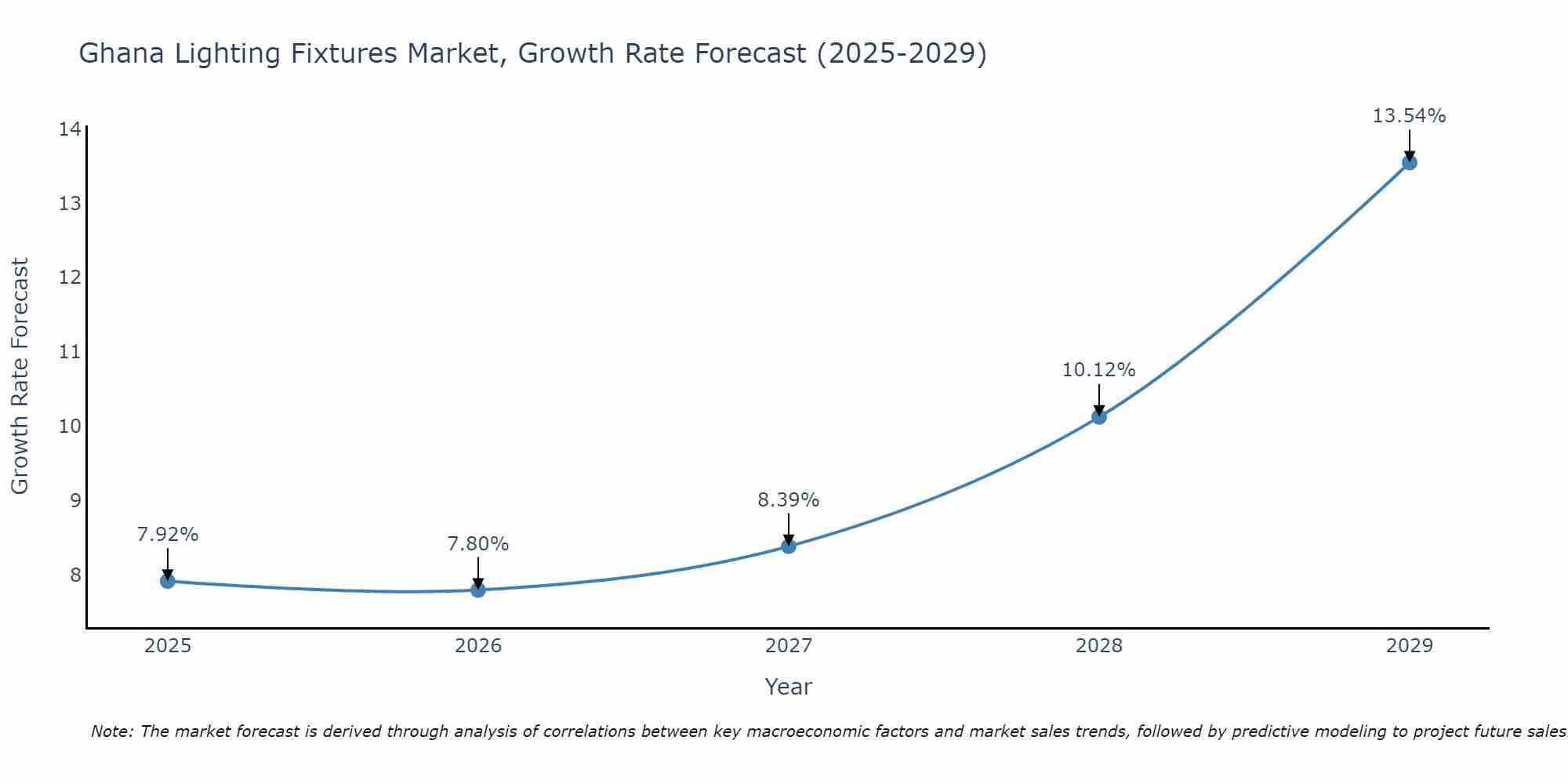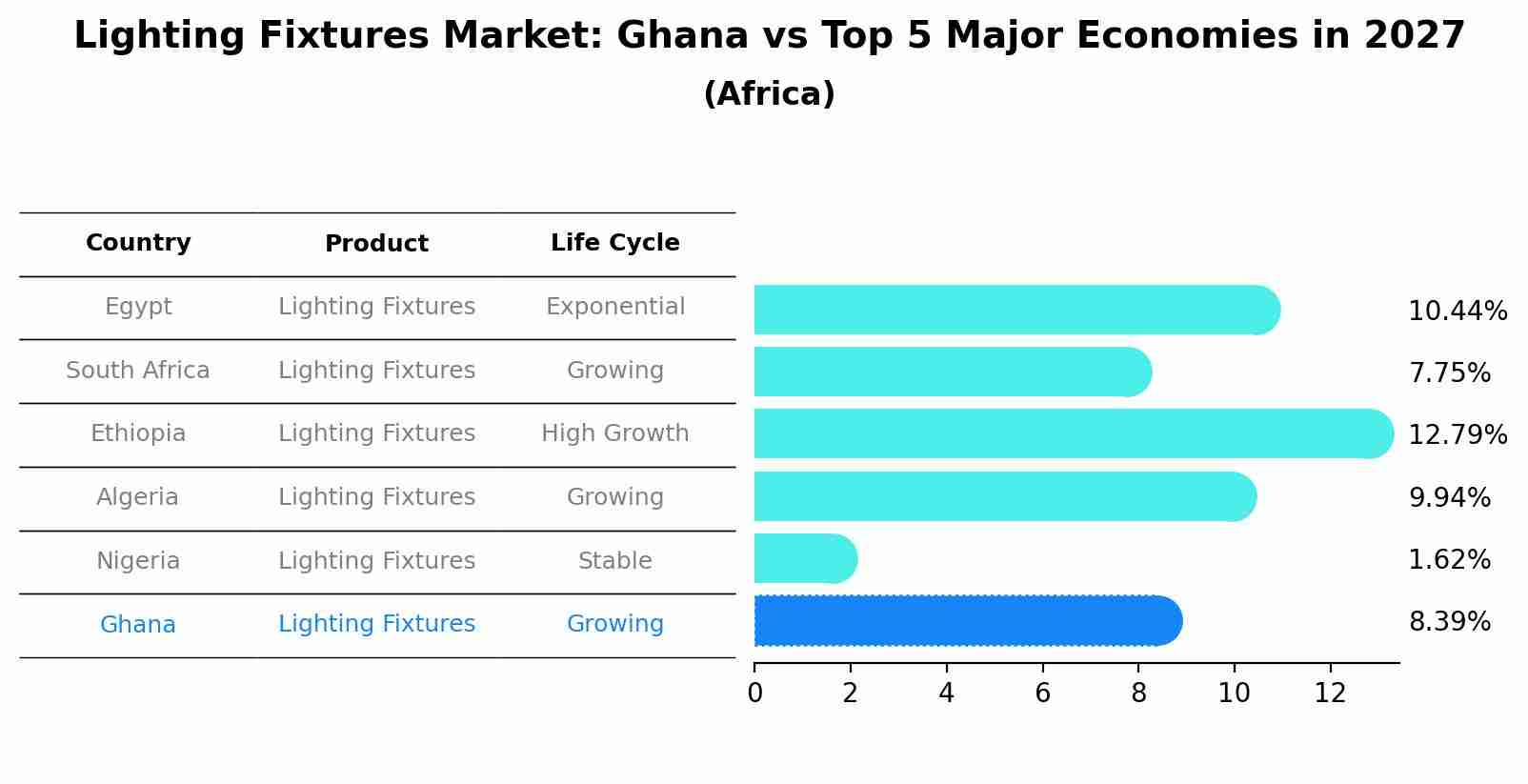Ghana Lighting Fixtures Market (2025-2031) Outlook | Analysis, Size, Forecast, Industry, Value, Growth, Trends, Revenue, Companies & Share
| Product Code: ETC372176 | Publication Date: Aug 2022 | Updated Date: Jul 2025 | Product Type: Market Research Report | |
| Publisher: 6Wresearch | Author: Sumit Sagar | No. of Pages: 75 | No. of Figures: 35 | No. of Tables: 20 |
Ghana Lighting Fixtures Market Size Growth Rate
The Ghana Lighting Fixtures Market is projected to witness mixed growth rate patterns during 2025 to 2029. Commencing at 7.92% in 2025, growth builds up to 13.54% by 2029.

Lighting Fixtures Market: Ghana vs Top 5 Major Economies in 2027 (Africa)
The Lighting Fixtures market in Ghana is projected to grow at a growing growth rate of 8.39% by 2027, within the Africa region led by Egypt, along with other countries like South Africa, Ethiopia, Algeria and Nigeria, collectively shaping a dynamic and evolving market environment driven by innovation and increasing adoption of emerging technologies.

Ghana Lighting Fixtures Market Synopsis
The Ghana Lighting Fixtures Market is experiencing steady growth driven by factors such as urbanization, infrastructural development, and increasing consumer preference for energy-efficient lighting solutions. LED lighting fixtures are gaining popularity due to their energy efficiency and longer lifespan. Key market players include Philips Lighting, Osram, and GE Lighting, offering a wide range of products catering to both residential and commercial sectors. The market is also witnessing a shift towards smart lighting solutions, driven by advancements in IoT technology. Government initiatives promoting energy-efficient lighting systems are further boosting market growth. With increasing disposable income and a growing focus on aesthetics, the demand for decorative lighting fixtures is also on the rise in Ghana.
Ghana Lighting Fixtures Market Trends
The Ghana lighting fixtures market is experiencing a shift towards energy-efficient and sustainable lighting solutions, driven by increasing awareness of environmental issues and the rising cost of electricity. LED lighting fixtures are gaining popularity due to their energy efficiency, long lifespan, and decreasing prices, appealing to both residential and commercial consumers. Smart lighting technology is also emerging as a trend in the market, offering features like remote control, automation, and customization options. Additionally, there is a growing demand for decorative and designer lighting fixtures in Ghana, as consumers seek to enhance the aesthetic appeal of their living spaces. Overall, the market is evolving towards more efficient, sustainable, and technologically advanced lighting solutions to meet the changing needs and preferences of consumers.
Ghana Lighting Fixtures Market Challenges
In the Ghana Lighting Fixtures Market, several challenges are prevalent. These include the high cost of quality lighting fixtures, which may deter price-sensitive consumers from purchasing them. Additionally, inconsistent power supply and frequent outages in certain regions of Ghana pose a challenge for the adoption and usage of lighting fixtures. Limited awareness and understanding of the benefits of energy-efficient lighting solutions among consumers and businesses also hinder market growth. Furthermore, the presence of counterfeit or low-quality lighting products in the market affects consumer trust and overall market competitiveness. Addressing these challenges will be crucial for the sustainable growth and development of the lighting fixtures market in Ghana.
Ghana Lighting Fixtures Market Investment Opportunities
The Ghana lighting fixtures market presents various investment opportunities due to the country`s growing urbanization, infrastructural development, and increasing consumer demand for energy-efficient lighting solutions. Potential areas for investment include LED lighting products, solar-powered lighting solutions, smart lighting systems, and decorative fixtures. With an increasing focus on sustainability and energy efficiency, there is a growing market for eco-friendly lighting options in both residential and commercial sectors. Additionally, the government`s initiatives to promote renewable energy and energy-efficient technologies create a favorable environment for investments in innovative lighting solutions. Collaborating with local distributors and manufacturers can also enhance market penetration and growth opportunities in the Ghana lighting fixtures market.
Jordan Agar Market Government Policies
The Ghanaian government has implemented various policies related to the lighting fixtures market, focusing on energy efficiency and sustainability. The Energy Commission Act of 1997 established energy efficiency standards for lighting products, promoting the use of energy-saving technologies. Additionally, the Renewable Energy Act of 2011 aims to increase the adoption of renewable energy sources in the country, which includes promoting solar-powered lighting solutions. The government also offers incentives and tax breaks for companies investing in energy-efficient lighting technologies to encourage their adoption. Overall, the government`s policies in Ghana are geared towards promoting energy efficiency, sustainability, and the use of renewable energy sources in the lighting fixtures market.
Ghana Lighting Fixtures Market Future Outlook
The future outlook for the Ghana Lighting Fixtures Market appears promising, driven by factors such as increasing urbanization, growing demand for energy-efficient lighting solutions, and the government`s initiatives to promote sustainable development. With a rising awareness of the importance of efficient lighting in both residential and commercial spaces, there is a shift towards LED and other eco-friendly lighting options. The market is expected to witness steady growth as consumers seek modern, stylish, and energy-saving lighting fixtures. Additionally, the increasing focus on smart lighting technologies and the adoption of IoT in lighting systems are likely to further propel market growth in Ghana. Overall, the Ghana Lighting Fixtures Market is poised for expansion and innovation in the coming years.
Key Highlights of the Report:
- Ghana Lighting Fixtures Market Outlook
- Market Size of Ghana Lighting Fixtures Market, 2024
- Forecast of Ghana Lighting Fixtures Market, 2031
- Historical Data and Forecast of Ghana Lighting Fixtures Revenues & Volume for the Period 2021 - 2031
- Ghana Lighting Fixtures Market Trend Evolution
- Ghana Lighting Fixtures Market Drivers and Challenges
- Ghana Lighting Fixtures Price Trends
- Ghana Lighting Fixtures Porter's Five Forces
- Ghana Lighting Fixtures Industry Life Cycle
- Historical Data and Forecast of Ghana Lighting Fixtures Market Revenues & Volume By Source for the Period 2021 - 2031
- Historical Data and Forecast of Ghana Lighting Fixtures Market Revenues & Volume By Incandescent for the Period 2021 - 2031
- Historical Data and Forecast of Ghana Lighting Fixtures Market Revenues & Volume By Fluorescent for the Period 2021 - 2031
- Historical Data and Forecast of Ghana Lighting Fixtures Market Revenues & Volume By LED & OLED for the Period 2021 - 2031
- Historical Data and Forecast of Ghana Lighting Fixtures Market Revenues & Volume By Product for the Period 2021 - 2031
- Historical Data and Forecast of Ghana Lighting Fixtures Market Revenues & Volume By Ceiling for the Period 2021 - 2031
- Historical Data and Forecast of Ghana Lighting Fixtures Market Revenues & Volume By Pendant & Chandeliers for the Period 2021 - 2031
- Historical Data and Forecast of Ghana Lighting Fixtures Market Revenues & Volume By Wall Mounted for the Period 2021 - 2031
- Historical Data and Forecast of Ghana Lighting Fixtures Market Revenues & Volume By Portable for the Period 2021 - 2031
- Historical Data and Forecast of Ghana Lighting Fixtures Market Revenues & Volume By Others for the Period 2021 - 2031
- Historical Data and Forecast of Ghana Lighting Fixtures Market Revenues & Volume By Distribution Channel for the Period 2021 - 2031
- Historical Data and Forecast of Ghana Lighting Fixtures Market Revenues & Volume By Offline for the Period 2021 - 2031
- Historical Data and Forecast of Ghana Lighting Fixtures Market Revenues & Volume By Online for the Period 2021 - 2031
- Historical Data and Forecast of Ghana Lighting Fixtures Market Revenues & Volume By Application for the Period 2021 - 2031
- Historical Data and Forecast of Ghana Lighting Fixtures Market Revenues & Volume By Residential for the Period 2021 - 2031
- Historical Data and Forecast of Ghana Lighting Fixtures Market Revenues & Volume By Commercial for the Period 2021 - 2031
- Ghana Lighting Fixtures Import Export Trade Statistics
- Market Opportunity Assessment By Source
- Market Opportunity Assessment By Product
- Market Opportunity Assessment By Distribution Channel
- Market Opportunity Assessment By Application
- Ghana Lighting Fixtures Top Companies Market Share
- Ghana Lighting Fixtures Competitive Benchmarking By Technical and Operational Parameters
- Ghana Lighting Fixtures Company Profiles
- Ghana Lighting Fixtures Key Strategic Recommendations
Frequently Asked Questions About the Market Study (FAQs):
- Single User License$ 1,995
- Department License$ 2,400
- Site License$ 3,120
- Global License$ 3,795
Search
Related Reports
- UAE Building Thermal Insulation Market Outlook (2025-2031) | Revenue, Companies, Share, Trends, Growth, Size, Forecast, Industry, Analysis & Value
- Portugal Electronic Document Management Market (2025-2031) | Strategy, Consumer Insights, Analysis, Investment Trends, Opportunities, Growth, Size, Share, Industry, Revenue, Segments, Value, Segmentation, Supply, Forecast, Restraints, Outlook, Competition, Drivers, Trends, Demand, Pricing Analysis, Competitive, Strategic Insights, Companies, Challenges
- France Electronic Document Management Market (2025-2031) | Strategy, Consumer Insights, Analysis, Investment Trends, Opportunities, Growth, Size, Share, Industry, Revenue, Segments, Value, Segmentation, Supply, Forecast, Restraints, Outlook, Competition, Drivers, Trends, Demand, Pricing Analysis, Competitive, Strategic Insights, Companies, Challenges
- Portugal Occupational Health & Safety Services Market (2025-2031) | Strategy, Consumer Insights, Analysis, Investment Trends, Opportunities, Growth, Size, Share, Industry, Revenue, Segments, Value, Segmentation, Supply, Forecast, Restraints, Outlook, Competition, Drivers, Trends, Demand, Pricing Analysis, Competitive, Strategic Insights, Companies, Challenges
- Netherlands Occupational Health and Safety Services Market (2025-2031) | Strategy, Consumer Insights, Analysis, Investment Trends, Opportunities, Growth, Size, Share, Industry, Revenue, Segments, Value, Segmentation, Supply, Forecast, Restraints, Outlook, Competition, Drivers, Trends, Demand, Pricing Analysis, Competitive, Strategic Insights, Companies, Challenges
- Belgium and Luxembourg Facility Management Market (2025-2031) | Strategy, Consumer Insights, Analysis, Investment Trends, Opportunities, Growth, Size, Share, Industry, Revenue, Segments, Value, Segmentation, Supply, Forecast, Restraints, Outlook, Competition, Drivers, Trends, Demand, Pricing Analysis, Competitive, Strategic Insights, Companies, Challenges
- Russia Women Intimate Apparel Market (2025-2031) | Strategy, Consumer Insights, Analysis, Investment Trends, Opportunities, Growth, Size, Share, Industry, Revenue, Segments, Value, Segmentation, Supply, Forecast, Restraints, Outlook, Competition, Drivers, Trends, Demand, Pricing Analysis, Competitive, Strategic Insights, Companies, Challenges
- Africa Chocolate Market (2025-2031) | Size, Share, Trends, Growth, Revenue, Analysis, Forecast, industry & Outlook
- Global Hydroxychloroquine And Chloroquine Market (2025-2031) | Industry, Trends, Size, Outlook, Growth, Value, Companies, Revenue, Analysis, Share, Forecast
- Saudi Arabia Plant Maintenance Market (2025-2031) | Industry, Size, Growth, Revenue, Value, Companies, Forecast, Analysis, Share & Trends
Industry Events and Analyst Meet
Our Clients
Whitepaper
- Middle East & Africa Commercial Security Market Click here to view more.
- Middle East & Africa Fire Safety Systems & Equipment Market Click here to view more.
- GCC Drone Market Click here to view more.
- Middle East Lighting Fixture Market Click here to view more.
- GCC Physical & Perimeter Security Market Click here to view more.
6WResearch In News
- Doha a strategic location for EV manufacturing hub: IPA Qatar
- Demand for luxury TVs surging in the GCC, says Samsung
- Empowering Growth: The Thriving Journey of Bangladesh’s Cable Industry
- Demand for luxury TVs surging in the GCC, says Samsung
- Video call with a traditional healer? Once unthinkable, it’s now common in South Africa
- Intelligent Buildings To Smooth GCC’s Path To Net Zero













